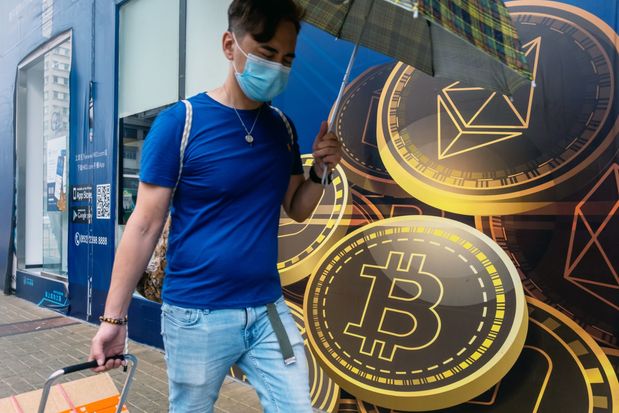China’s Ban on Crypto Isn’t Hurting Bitcoin. Here’s Why.
The world’s most infamous crypto is taking the crackdown in stride.
China’s latest moves to ban cryptocurrency transactions are causing exchanges to shut down in the country, but Bitcoin and its counterparts appear to be taking the crackdown in stride.
Prices for Bitcoin and Ethereum, the two largest cryptos, have risen more than 7% and 15%, respectively, from their low points on Friday, when China’s new ban was published, according to Fundstrat Global Advisors.
Bitcoin was trading around $43,600 Monday morning, down slightly from before China’s announcement. Ethereum, at around $3,090, has also recouped losses since Friday’s sell-off took the coin down to $2,750.
Other cryptos fared even better over the weekend—notably the tokens used to process trades on decentralized exchanges, known as DEXes. Uniswap, Sushiswap, and dYdx, the tokens associated with those three venues, have surged more than 30% since Friday as activity on those platforms took off.
Trading on the dYdX DEX topped that on Coinbase Global (ticker: COIN) over the weekend, according to Fundstat, pushing the token’s price up 80%.
DEXes allow users to swap tokens with far more privacy and anonymity than a standard brokerage. Users may be able to set up accounts without providing their names or addresses, simply by registering a digital wallet that is associated with an IP address and security keys. Trading occurs automatically using software code and “smart contracts” between buyers and sellers, or lenders and borrowers.
China appears intent on shutting down commercial crypto transactions and trading in the country. The People’s Bank of China and other regulatory agencies warned citizens of stiff penalties if they were caught trading cryptos or related products.
One of the largest exchanges in China, Huobi Global, has stopped opening accounts for new customers in mainland China, effective this past Friday. It said on Sunday that it would “gradually retire” existing accounts by the end of the year.
Binance, another major exchange, has also suspended new accounts in China. It said Monday that users in Singapore wouldn’t be able to access its site for deposits or trading of cryptos, starting Oct 26., and that users in the country were advised to “cease all related trades, withdraw fiat assets and redeem tokens by Wednesday.”
Singapore’s central bank warned in early September that Binance may be violating payment regulations in the country.
Yet the crypto markets aren’t tanking, even as China and other countries in Asia move to restrict commercial transactions.
One explanation is that traders can migrate to DEXes where it may be harder for regulators to track transactions. Uniswap and other exchanges could be beneficiaries if trading volume moves to their platforms long-term.
As Fundstrat noted, moreover, much of the Bitcoin that has been mined, or produced, doesn’t circulate, and more of it may be kept offline. About 70% of all circulating Bitcoins is now held by long-term holders, up from 59% in May. “This indicates that ‘whales’ have continued buying into recent volatility,” Fundstrat said.
China has periodically tried to restrict crypto activity and Bitcoin has shrugged it off. Not including the latest crackdown, China has announced tough new measures on crypto six times since 2013. Bitcoin fell an average 4% in the week after the announcements but was up an average 46% a year later.
“The lesson here is that if you invest in crypto long enough, you start to develop a circadian-like rhythm in which you find yourself unsurprised by panic-selling initiated by seemingly routine ‘FUD’ released by the Chinese government,” Fundstrat wrote, referring to fear, uncertainty, and doubt.
Nonetheless, trading on DEX platforms isn’t as easy as it is on the major sites. It takes more technical skill than simply opening an account with a brokerage service and funding it through a bank account. Active crypto traders may not be deterred, but the casual investor may find it too cumbersome–and hardly worth the potential penalties in an authoritarian country like China.
The message from crypto markets now is that they don’t need China or its vast market of investors. Whether that lasts remains to be seen, especially if other countries follow in China’s path.
Write
 Copyright 2020, Dow Jones & Company, Inc. All Rights Reserved Worldwide. LEARN MORE
Copyright 2020, Dow Jones & Company, Inc. All Rights Reserved Worldwide. LEARN MORE
This stylish family home combines a classic palette and finishes with a flexible floorplan
Just 55 minutes from Sydney, make this your creative getaway located in the majestic Hawkesbury region.
Continued stagflation and cost of living pressures are causing couples to think twice about starting a family, new data has revealed, with long term impacts expected
Australia is in the midst of a ‘baby recession’ with preliminary estimates showing the number of births in 2023 fell by more than four percent to the lowest level since 2006, according to KPMG. The consultancy firm says this reflects the impact of cost-of-living pressures on the feasibility of younger Australians starting a family.
KPMG estimates that 289,100 babies were born in 2023. This compares to 300,684 babies in 2022 and 309,996 in 2021, according to the Australian Bureau of Statistics (ABS). KPMG urban economist Terry Rawnsley said weak economic growth often leads to a reduced number of births. In 2023, ABS data shows gross domestic product (GDP) fell to 1.5 percent. Despite the population growing by 2.5 percent in 2023, GDP on a per capita basis went into negative territory, down one percent over the 12 months.
“Birth rates provide insight into long-term population growth as well as the current confidence of Australian families,” said Mr Rawnsley. “We haven’t seen such a sharp drop in births in Australia since the period of economic stagflation in the 1970s, which coincided with the initial widespread adoption of the contraceptive pill.”
Mr Rawnsley said many Australian couples delayed starting a family while the pandemic played out in 2020. The number of births fell from 305,832 in 2019 to 294,369 in 2020. Then in 2021, strong employment and vast amounts of stimulus money, along with high household savings due to lockdowns, gave couples better financial means to have a baby. This led to a rebound in births.
However, the re-opening of the global economy in 2022 led to soaring inflation. By the start of 2023, the Australian consumer price index (CPI) had risen to its highest level since 1990 at 7.8 percent per annum. By that stage, the Reserve Bank had already commenced an aggressive rate-hiking strategy to fight inflation and had raised the cash rate every month between May and December 2022.
Five more rate hikes during 2023 put further pressure on couples with mortgages and put the brakes on family formation. “This combination of the pandemic and rapid economic changes explains the spike and subsequent sharp decline in birth rates we have observed over the past four years,” Mr Rawnsley said.
The impact of high costs of living on couples’ decision to have a baby is highlighted in births data for the capital cities. KPMG estimates there were 60,860 births in Sydney in 2023, down 8.6 percent from 2019. There were 56,270 births in Melbourne, down 7.3 percent. In Perth, there were 25,020 births, down 6 percent, while in Brisbane there were 30,250 births, down 4.3 percent. Canberra was the only capital city where there was no fall in the number of births in 2023 compared to 2019.
“CPI growth in Canberra has been slightly subdued compared to that in other major cities, and the economic outlook has remained strong,” Mr Rawnsley said. “This means families have not been hurting as much as those in other capital cities, and in turn, we’ve seen a stabilisation of births in the ACT.”
This stylish family home combines a classic palette and finishes with a flexible floorplan
Just 55 minutes from Sydney, make this your creative getaway located in the majestic Hawkesbury region.






















